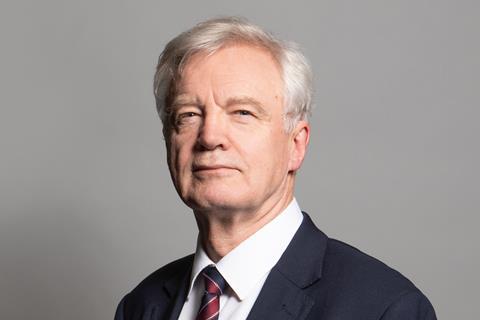Lawyers at the centre of investigating the Libor rigging scandal made ‘fundamental errors’ which protected bank bosses from prosecution, a senior backbencher has told parliament.
Conservative David Davis MP said that regulators investigating potential wrongdoing by banks in the wake of the financial crash outsourced this work to external lawyers hired by the banks themselves.
Davis said these lawyers, acting principally for Barclays and UBS, ‘did not examine crucial documents’, including the emails of senior executives. This kick-started what he called the ‘scapegoating’ of low-ranking bankers by prosecutors, courts, directors and executives, with Barclays sacking employees further down the chain and cutting off any legal support.
Davis said: ‘While the real villains got off scot-free, the scapegoats, including some whistleblowers, faced coercion and injustice. Their lives were destroyed by a totally inadequate regulatory and judicial system. In British courts, critical evidence was concealed. In America, the [Department of Justice] used tactics that amounted to judicial blackmail.’
The Libor scandal came to light in 2010 when it was reported that bankers at major financial institutions had colluded to manipulate the London interbank offered rate, otherwise known as Libor. The rate was used to set the interest at which banks borrowed money from each other and as a reference for financial instruments including commercial loans, mortgages and student loans.

Speaking in the Commons on Tuesday, Davis cited a recorded conversation between two London employees of Barclays: Peter Johnson, responsible for Libor submissions, and his manager Mark Dearlove.
Dearlove was recorded telling Johnson there had been ‘serious pressure from the UK government and the Bank of England about pushing our Libors lower’, but Davis said those responsible for this 'lowballing' were not pursued by prosecutors.
He added: ‘Not all faced the same treatment. Dearlove, for example, heavily supported by lawyers paid for by Barclays, pointed out that the instruction to lowball had come from the Bank of England and Whitehall. His case was immediately dropped like a dangerous hot potato.’
In contrast, former trader Tom Hayes was prosecuted and received a 14-year sentence, despite an ‘abundance’ of evidence which showed what he was doing was normal and was permitted by regulators and central banks. Davis said 37 people were prosecuted, 19 convicted and nine jailed ‘simply for doing their jobs’, adding: ‘The theme repeated itself throughout the trials: important evidence was withheld, and the evidence offered came from non-experts or people who knew about or had condoned the behaviour.’
Davis called for the Metropolitan Police to review the evidence to examine whether any perjury was committed, and for the Treasury select committee to open a new inquiry on the matter.
This article is now closed for comment.



























9 Readers' comments